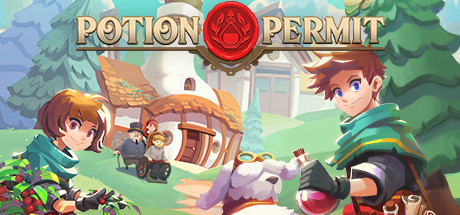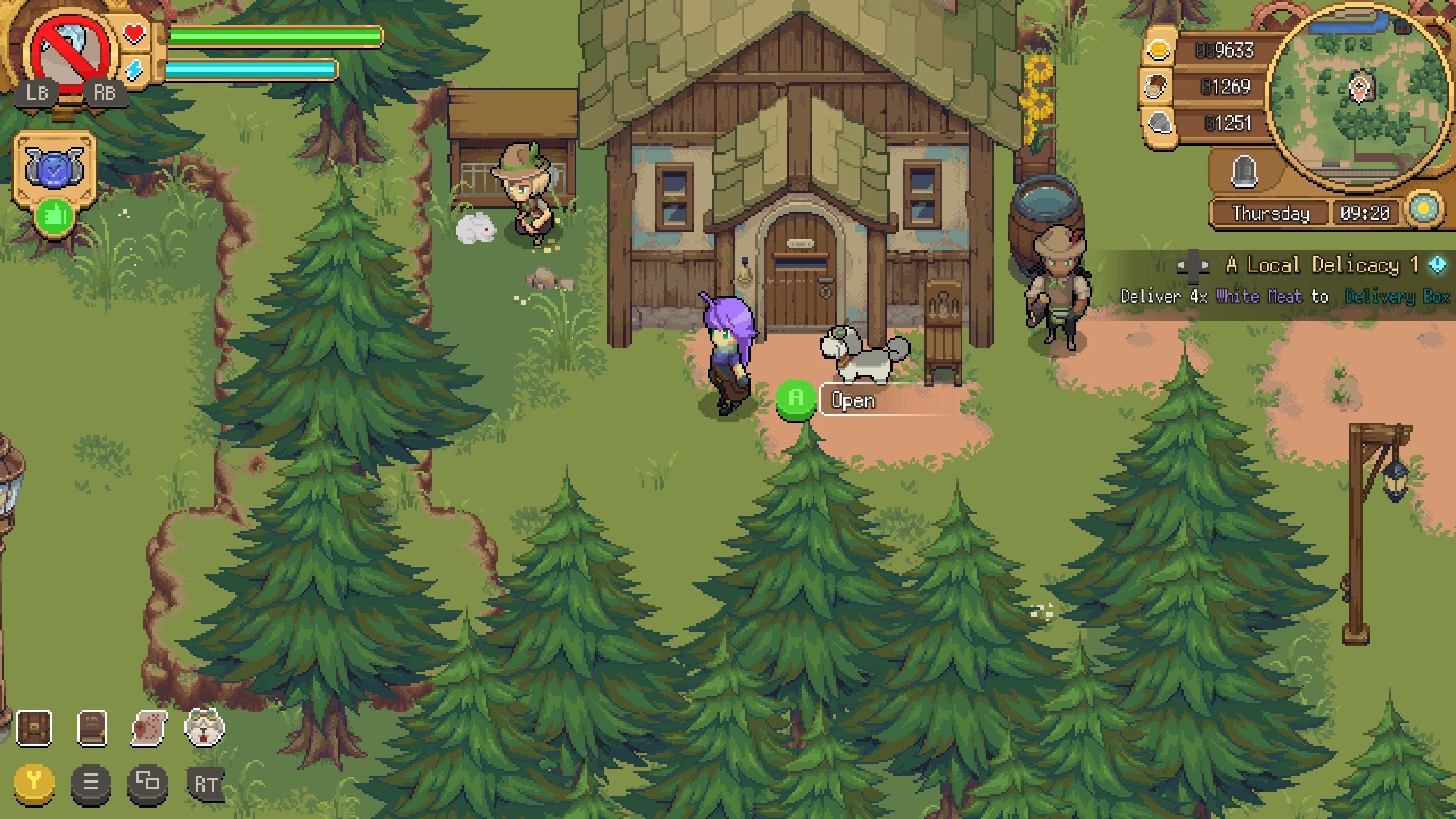
Potion Permit
Potion Permit is a wholesome life sim in the vein of Harvest Moon / Stardew Valley / Graveyard Keeper / Rune Factory with a focus on preparing potions in order to heal people. It’s much shorter and less complex than the blockbusters of the genre and it does have its own shortcomings, but it’s still a deeply relaxing, warm and fuzzy experience.

Your playable character is a young chemist, assigned to the small town of Moonbury as their new doctor. Due to the fact that its inhabitants had negative experiences with previous chemists, who appear to have partially damaged parts of their land with their experiments while trying to restore the environment, they are very reserved towards you at first, but as you start helping them with their endeavors and give them a daily dose of attention, they will begin trusting you and will slowly warm up to you.

Your relationship with another person will improve every time you talk to them or give them gifts, and after each tier of friendship you unlock one side quest specific for that character, in which they share with you their life struggles and ask for your assistance in solving them. Moonbury’s residents have unique personality traits and are rather individualized, yet most of them remain one-dimensional, even after getting to know them better through these quests. Their personal issues or needs aren’t explored deeply enough (although each quest comes with a fairly lengthy cutscene / dialog) and they are not interesting enough to make the player invested in. Outside of these two personal quests, the characters have a very narrow range of lines, which makes talking to them daily (for relationship status increase) quite repetitive and somewhat boring due to the lack of a novelty element.
Unfortunately, the dating process doesn’t really improve anything in that regard. Among the 30 adult residents of Moonbury, there are 6 romanceable options that you can pick from, no matter the gender you choose for your character. There is no marriage option, and you aren’t allowed to change your partner after you’ve made up your mind. Dating adds one extra interaction option with that character usable once per day, which triggers one of three possible cutscenes of you and them enjoying a romantic date. I had high hopes for this part of the game, yet that’s all there was to it.

A typical day in Moonbury starts at 6 AM, with your health and stamina bars fully filled. You will likely want to tend to the patients newly arrived at the clinic first (it’s usually a new one every few days) by diagnosing their symptoms, then craft the potions needed to cure them. The diagnosis is done through varying easy minigames that can be completed in mere seconds, while the actual potion crafting process is designed as a jigsaw-like puzzle in which you have to fill-in a grid with block shapes.

Each ingredient that you gather has a Tetris-like shape and belongs to a specific earth / fire / wind / water element; these will represent the building blocks of your potion. You can freely choose how to mix and match the ingredients (aka the shapes), as long as the pattern gets fully filled and as long as you use up to a certain number of ingredients (depending on the cauldron’s size – which can be upgraded), but depending on the potion crafted, there can be restrictions in regards to what elements are permitted. Since you can use any of the ingredients available and even the same shape multiple times, the puzzles can be solved in a multitude of ways.

In order to gather ingredients, you’ll have to venture in the areas around town, where you can harvest plants, trees and rocks with your sickle, axe and hammer. These tools will also be used to fight off enemies – half of them are designed to just ignore you, while the other half will attack you on sight. There are three major resource hubs, with distinctive biomes, split into several smaller regions, with a central fast travel spot in each of them. One harvesting day is usually more than enough to clear out one or two of these smaller areas in one go. In life sims I often feel that the stamina bar is not big enough to accommodate everything that I plan on doing that specific day, but in Potion Permit I found this mechanic to be quite balanced. You can also fully recharge your health and stamina anytime in the town’s bathhouse at no cost, as long as you’re comfortable bathing together with a random selection of your fellow residents – especially scary when you’re the only girl in a tub full of bachelor sharks!

If you’re not in the mood to gather resources, you can either spend your time earning some extra money by doing weekly quests from the town’s billboard or engaging in daily work to help the church, post office or the police department; you can fish, do some friendship side quests, chit-chat with others or simply relax in the arcade section by playing a whack-a-mole minigame. There is absolutely no farming component in the game, but you can cook dishes (some of the more advanced ones even restore a good chunk of your health and stamina).
Each institution has its own working hours, and the quests are also restricted to certain days / time slots, therefore you will have to pre-plan your activities each day. While there are a handful of tasks for you to choose from, neither of them is particularly useful / impactful for your game progression, nor very interesting – yet, they are still fun to do, at least for completionism purposes if not for anything else.

When it comes to life sims, grinding for resources is a given but in Potion Permit this was quite demanding, at least more than I was comfortable doing. For the second half of the game, a massive amount of wood and stone is needed, thousands of these for each upgrade at a rate of 30-60 per tree / stone harvested in the highest difficulty area, where the enemies are much more aggressive and harder to kill – roughly one in-game week per upgrade. It becomes a chore more than anything else and it appears that the game was designed like this only to artificially inflate the playtime.
While the main story / quests can be finished in around 10-15h (including all the grinding needed), a lot more than that is required in order to upgrade everything to max level or to complete all the side quests, and most of this time will be spent on grinding resources. The game doesn’t have an actual “finale” after the main quests are done (nor a real conclusion to the story), and you’ll just keep playing it like it’s yet another day, without knowing that it actually ended, and without a specific goal (apart from some self-set ones of maximizing your relationships and upgrading everything). Unfortunately, between the final quest of the main story and the actual end of the game there’s a huge gap of ~30h that will be filled mostly with routine tasks.

Potion Permit could be regarded as an easier and simpler version of Stardew Valley, but don’t expect it to rise up to its standards – after all, Stardew Valley had plenty of time to ripen up over the years, and lots of updates and mechanics were added based on community feedback. As a newly released addition to the genre, Potion Permit is a solid game that stands on its own, but it does have some areas where improvements could be made for it to rise from “good” to “great”. In its current state, its formula works well because it’s so easy and simple to handle, both in regards to the combat and crafting, as well as the overall game progression. It can become a tad repetitive at times but it’s still an entertaining, addictive and fun pastime, best to be picked up with a discount considering that it costs more than Stardew Valley.